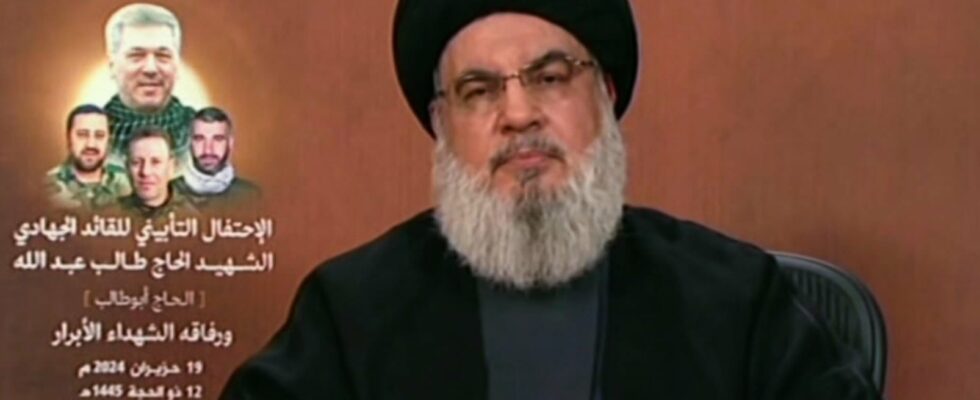Israel announced this Saturday, September 28, the death of Hezbollah leader Hassan Nasrallah, “eliminated” in a massive strike the day before on the southern suburbs of Beirut. The Lebanese Shiite movement has not confirmed this death. L’Express takes stock of what we know.
What is the fate of Nasrallah?
“Hassan Nasrallah is dead,” a spokesperson for the Israeli army, Lieutenant-Colonel Nadav Shoshani, declared on X on Saturday morning. Another army spokesperson, Captain David Avraham, confirmed to AFP that the Hezbollah leader had been “eliminated” in the strike which targeted an area of the southern suburbs of Beirut on Friday, presented by Israel as the HQ of the movement.
Shortly after this strike, a source close to Hezbollah assured that its leader was “doing well”. But on Saturday morning, another source close to the pro-Iranian group admitted that contact had been “lost” with Hassan Nasrallah since Friday evening, without confirming his death. The 64-year-old Hezbollah leader is considered the most powerful man in Lebanon. For years he has lived in hiding and rarely appears in public. In 2006, during the last war between Israel and Hezbollah, the leader of the movement disappeared for two days and there were rumors of his death, before he reappeared.
The chief of staff of the Israeli army, General Herzi Halevi, promised this Saturday in a press release to “reach” anyone threatening Israel. “We have not exhausted all the means at our disposal. The message is simple: whoever threatens the citizens of Israel, we will know how to reach them,” he said. According to an Israeli army statement, Friday’s bombing in Beirut also caused the death of Ali Karaké, identified as the commander of Hezbollah’s southern front, as well as other commanders of the movement. “During his 32-year rule as Hezbollah’s secretary general, Hassan Nasrallah was responsible for the murder of numerous Israeli civilians and soldiers, as well as the planning and execution of thousands of terrorist activities,” he added. army in a press release. “He was responsible for directing and executing terrorist attacks around the world, during which civilians of various nationalities were murdered. Nasrallah was the main decision-maker and strategic leader of the organization,” continues the ‘army.
What happened on Friday?
Just before 6:30 p.m. Friday, huge explosions rang out in Beirut and its surroundings, causing panic among residents. A “series of Israeli strikes targeted the southern suburbs” of the capital, a stronghold of Hezbollah, reports the official Lebanese press agency.
Columns of smoke rising from different places are visible in images broadcast live by local television and ambulance sirens ring out in the Lebanese capital. The raid destroyed dozens of buildings, forced hundreds of people to flee and left at least six dead, according to a report from the Lebanese Ministry of Health.
At the site of the strikes, in Haret Hreik, several huge craters measuring up to five meters in diameter were visible, according to AFP photographers on site. Residents of the densely populated neighborhood told AFP of hearing successive explosions and having their homes “shaken” by them.
Israel said shortly after carrying out a “precise strike” on Hezbollah’s “headquarters” in Beirut’s southern suburbs. The army spokesperson, Rear Admiral Daniel Hagari, specified that this headquarters was “located under residential buildings in the heart of Dahiyeh”, the Arabic term for “suburb”. A source close to Hezbollah said the strikes targeted buildings in a residential area where there are organizations and offices belonging to Hezbollah and its elected officials.
Intense nocturnal strikes
Throughout the night, Israeli strikes targeted several areas of the southern suburbs. After an evacuation warning issued Friday evening by the Israeli army, hundreds of residents of the southern suburbs fled in haste towards the capital a few kilometers away. Entire families slept in the street, in the city center or along the corniche. Hezbollah claimed responsibility for several rocket attacks against northern Israel on Saturday.
Hezbollah began firing rockets at Israel after the start of the war on October 7 in the Gaza Strip between the Palestinian Islamist movement Hamas and the Israeli army, apparently acting in support of Hamas, its ally. The war was sparked following Hamas’ unprecedented attack in southern Israel on October 7.
